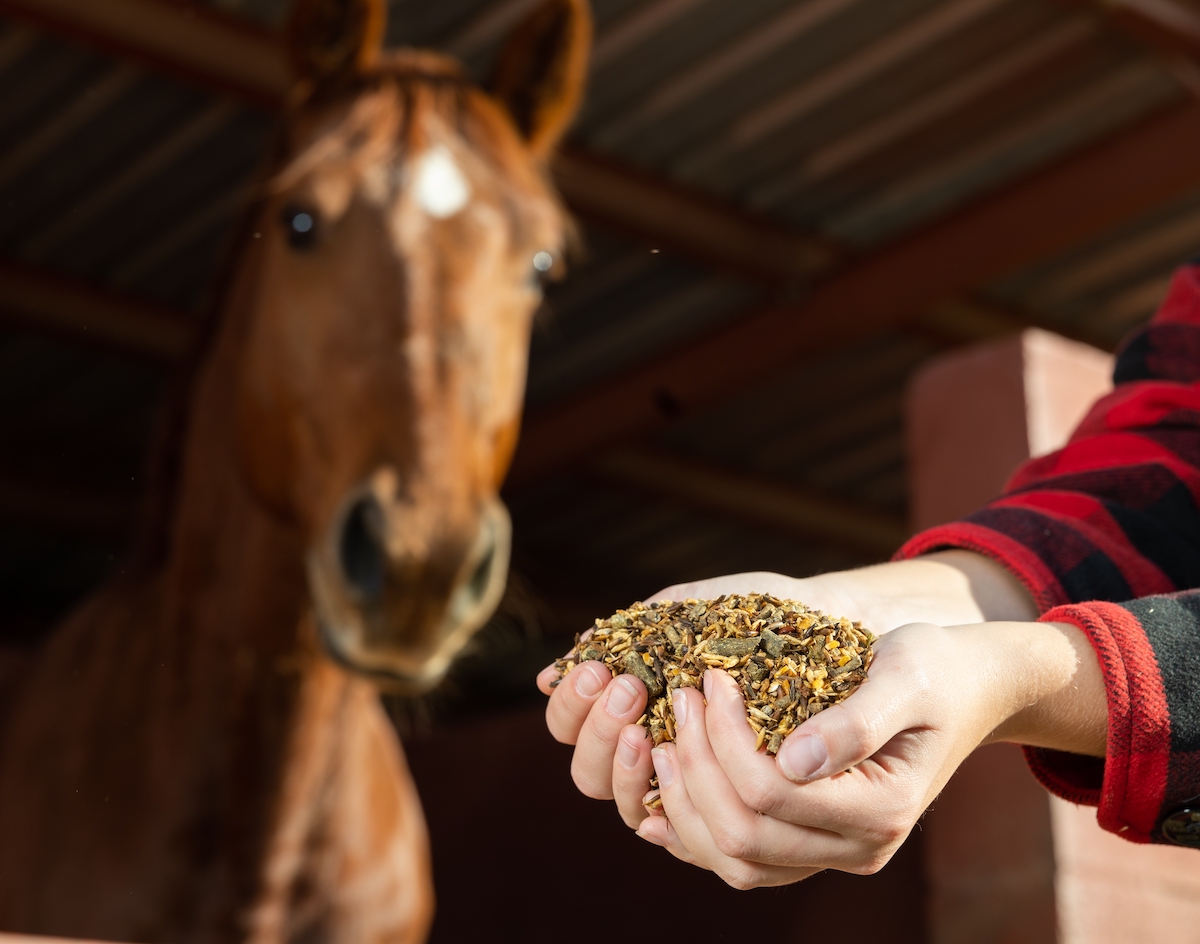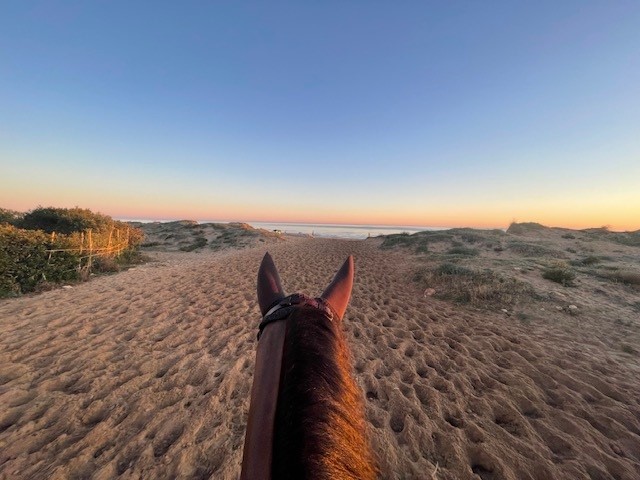Horse owners understand that what they feed directly impacts their horse’s health, but have you considered how meal timing influences performance?
While horses need constant access to forage throughout the day and night for optimal digestive function, owners should consider glycemic responses when determining the best time to feed grain. Consuming a grain meal has physiological effects that change how horses respond to exercise.
How Feed Timing Affects Performance Horses
Research demonstrates that consuming a grain meal has immediate effects on the body that can impact how your horse feels. Timing meals around exercise is especially vital for supporting optimal energy levels.
If your horses lack energy or quickly run out of gas during training sessions, their last meals may be to blame.
Physiological Responses After Meals
The digestion of feedstuffs leads to glucose (sugar) absorption into the horse’s blood from the gastrointestinal tract through the glycemic response. Elevated blood sugar levels trigger the secretion of insulin, which removes glucose from the bloodstream for storage in the tissues.
Studies show that insulin and blood glucose levels peak in horses two hours after a meal. So if you’ve noticed that your horses don’t seem as energetic as you’d expect after their morning meal time, blood sugar could be a key player. Significant increases in glucose result in the release of increased amounts of insulin, creating an energy slump when glucose levels suddenly begin to fall. (Rodiek et al., 2007)
Exercise Timing and Insulin Levels
Horses that begin exercising with elevated insulin levels use glucose for muscle contractions, while insulin removes glucose from circulation. This rapid depletion of glucose by simultaneous processes can lead to fatigue caused by low blood glucose. (Cunilleras et al., 2002)
To support optimal energy levels, owners should feed horses grain meals that cause significant peaks in blood glucose at least three to four hours before exercise. However, feed management that helps moderate blood glucose extremes can also support steady energy levels.
Grain vs. Forage
Different feedstuffs can alter the glycemic response. Energy derived from forages by fiber fermentation in the hindgut does not significantly affect blood glucose. Therefore, forages can safely be fed at all times of the day. (Pagan et al., 2010)
Feeding forage immediately before a training session can also support digestive health by providing stomach fill that protects the lining from ulceration.
Feed intake can also influence the glycemic response. Larger grain meals produce greater spikes in blood glucose that contribute to fatigue. If your horse eats grain, feeding smaller meals throughout the day can help moderate glucose levels and avoid these spikes. (Verveut et al., 2008)
NSCs in Equine Diets
Feeds that are high in non-structural carbohydrates (NSCs) are also associated with higher blood glucose spikes. NSCs are digested in the small intestine, where glucose crosses the intestinal lining to enter the bloodstream. (Dyer et al., 2010)
Low-starch, high-fiber forage provides a steadier energy source for horses. The gut microbiota digests fiber in the hindgut to produce short-chain fatty acids, their primary energy source. Therefore, a healthy hindgut and balanced microbiome are critical for healthy energy levels.
In our article “How to Feed Speed Horses”, you can learn about healthy ways to support energy levels in performance horses.
When is the Best Time to Feed SUCCEED?
Strategic timing is also essential for the effective use of supplements like SUCCEED.
SUCCEED Digestive Conditioning Program is a daily nutritional supplement that helps keep the digestive tract in optimal condition. Using SUCCEED is simple and easy, but following recommendations can help owners ensure their horses get the full benefits.
Feed SUCCEED twice daily for the first week to 10 days to condition the digestive system. After this initial period, feed SUCCEED at the same feeding each day. The best timing will depend on the different available forms of the supplement.
Also, many people find that giving an extra serving of SUCCEED before hauling, while away from home, or before competing helps their horses to better manage these stressful situations.
SUCCEED Oral Paste
If you prefer the oral paste, use the syringe to empty the paste directly into the horse’s mouth immediately before feeding. You can also top-dress your feed with the oral paste, but don’t leave SUCCEED exposed to air for more than 30 minutes to maximize palatability.
It doesn’t matter what time of day you give your horses SUCCEED. However, providing SUCCEED paste immediately before the same meal every day will promote the best results. Many owners prefer to give SUCCEED paste in the morning before the first meal of the day.
SUCCEED Granules
If you use the granules, you’ll need to apply one scoop of SUCCEED directly to the top of your feed daily. Like the paste, the time of day doesn’t matter. However, you should still aim to feed the granules at the same time every day and avoid prolonged air exposure.
The best meal to add SUCCEED granules to will depend on your barn schedule. For example, some boarding barns prepare morning meals the prior evening. In this case, adding SUCCEED to afternoon meals will help minimize air exposure.
While the time of the day doesn’t matter for SUCCEED administration, meal timing can significantly impact your horses’ health and performance. It’s not just about what you feed, but when.
Take the SUCCEED Challenge
SUCCEED Digestive Conditioning Program helps horses get the slow-burning energy they need for performance by promoting optimal digestion and a proper transit rate of feed. SUCCEED also provides beta-glucan, which helps regulate the release of sugars from the digestive system to reduce glycemic peaks.
New customers in the U.S. can take the SUCCEED Challenge to try the digestive conditioning program risk-free for 60 days. Find out where to buy SUCCEED DCP today and support your horse’s peak performance tomorrow.
References
- Rodiek, A. et al. Glycemic Index of Ten Common Horse Feeds. J Equine Vet Sci. 2007.
- Cunilleras, E. et al. Glycemic index of a meal fed before exercise alters substrate use and glucose flux in exercising horses. J Appl Physiol. 2002.
- Pagan, J. et al. The effects of timing and amount of forage and grain on exercise response in Thoroughbred horses. Equine Vet J. 2010.
- Verveut, I. et al. Effect of feeding increasing quantities of starch on glycaemic and insulinaemic responses in healthy horses. Vet J. 2008.
- Dyer, J. et al. Molecular characterisation of carbohydrate digestion and absorption in equine small intestine. Equine Vet J. 2010.




